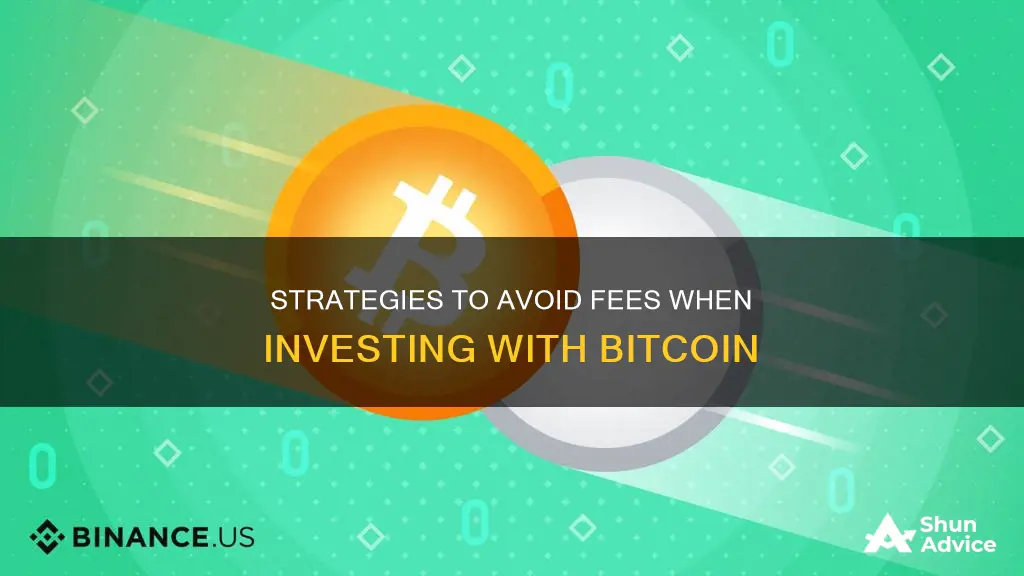
Investing in Bitcoin is an attractive prospect for many, but the fees involved can be off-putting. It is important to understand the different types of fees involved when investing in Bitcoin, such as funding and withdrawal fees, trading fees, and network fees. While it is currently not possible to avoid fees entirely when purchasing Bitcoin, there are ways to minimise costs. For example, some exchanges offer zero-fee trading for certain cryptocurrencies, while others provide promotional discounts or referral codes. Additionally, some platforms offer premium memberships with no-fee trading. It is also worth noting that the fees involved can depend on the amount being invested, with flat fees being more advantageous for larger investments and percentage fees being better for smaller amounts.
| Characteristics | Values |
|---|---|
| Possible to buy Bitcoin with zero fees? | Yes, but only on certain platforms. |
| Platforms with zero fees | Lykke, River, Binance, Binance.US, Bybit, BitMEX, Robinhood, LocalBitcoins |
| Platforms with low fees | Crypto.com App, Phemex, Coinbase, Kucoin, Kraken |
| Types of fees | Funding and withdrawal fees, transaction fees, trading fees |
| Factors affecting fees | Frequency of trades, method of payment, amount of crypto, type of platform |
What You'll Learn

Understand the different types of fees
When investing in Bitcoin, there are several types of fees to be aware of. These fees can vary depending on the exchange you use and the size and frequency of your trades. Here is a breakdown of the different types of fees:
Funding and Withdrawal Fees
Some exchanges charge a fee to send or receive money from their platforms. This includes both traditional currencies and cryptocurrencies. The fee charged to add funds to your account is called a "funding fee" or "deposit fee", while the fee to send funds from your account to an external wallet is called a "withdrawal fee". These fees can be structured as a flat fee, typically ranging from $1.99 to $5, or as a percentage, usually between 0.02% to 1%. It's important to understand these fees, especially if you're new to crypto, as they can significantly impact the cost of small trades.
Trading Fees
Most cryptocurrency exchanges charge a fee for each trade you make on their platform. This is typically a small percentage of the trade value, ranging from 0% to 1.5%. The specific fee structure can vary depending on the exchange and whether you are a maker (buyer) or taker (seller). Makers provide liquidity to the exchange by placing limit orders, while takers consume liquidity by using market orders. Some exchanges may also offer discounted fees for paying with their native stablecoin or for high-volume traders.
Transaction Fees (Mining Fees)
Whenever you transfer Bitcoin or other cryptocurrencies, you will need to pay a transaction fee. This fee is paid to the miners who validate and record your transaction on the blockchain. Transaction fees are not based on the amount of cryptocurrency being sent but rather on network demand. During periods of high demand, transaction fees can surge, while during off-peak hours, they can be much lower. It's important to check the current transaction fees before sending Bitcoin or other cryptocurrencies.
Platform Fees
Different crypto platforms may charge various fees for their services. For example, some platforms may charge account fees, listing fees, or premium service fees. It's important to review the fee structure of any platform you consider using to understand all the costs involved.
While it's not possible to completely avoid fees when investing in Bitcoin, understanding the different types of fees can help you minimise costs. Additionally, some platforms, such as Robinhood, eToro, and Lykke, offer fee-free services or zero-fee recurring orders, which can help reduce your overall trading expenses.
The Ultimate Guide to Investing in Bitcoin
You may want to see also

Use a platform with no fees
There are several platforms that allow you to buy Bitcoin with zero fees. Here is a list of some of the best zero-fee crypto trading exchanges:
- Bybit: This platform offers zero-fee trading on its spot exchange for 460 coins across 479 trading pairs.
- Binance: While Binance does charge fees on its derivatives and futures markets, it offers no-fee trading on several stablecoin pairs.
- MEXC: MEXC has one of the lowest fees across its spot and futures markets, with zero fees for maker orders.
- KuCoin: KuCoin offers zero-fee trading for Bitcoin, Ethereum, Litecoin, and XRP, with over 700 cryptocurrencies listed.
- Crypto.com: Crypto.com introduced the ability for users to trade between stablecoins without fees.
- Gate.io: Gate.io has removed all trading fees from multiple markets, including spot, perpetual futures, and P2P trading.
- Lykke: Lykke is an EU-based app that allows users to buy Bitcoin and other cryptocurrencies with no fees.
- River: River offers zero-fee recurring orders for Bitcoin.
It is important to note that some platforms may have certain limitations or conditions for their zero-fee offerings, so be sure to review the details before choosing an exchange.
Gold Coin Investment: Which Bullion is Best?
You may want to see also

Use a platform with low fees
When investing with Bitcoin, it's important to understand the different types of fees you may encounter. While it's currently not possible to avoid fees altogether, you can certainly minimise them by using a platform with low fees. Here are some tips to help you get started:
Do Your Research
Before signing up for an exchange, be sure to read reviews and compare different platforms. Check their fee structure, ease of use, liquidity, customer support, and range of coins available. While some platforms may advertise zero fees, they might make their profits by buying Bitcoin below market rates and selling it for more. So, it's important to do your due diligence and understand the fine print.
Consider Low-Fee Platforms
Several platforms are known for their relatively low fees, including Bybit, Binance, Crypto.com, Coinbase Pro, and Kraken. Bybit, for instance, typically charges a fee of 0.05% to trade crypto, and it also offers a free maker fee. Binance, on the other hand, charges fees ranging from 0.015% to 0.1%, and it often runs promotions with zero fees for specific pairs or markets. Crypto.com has maker and taker fees ranging from 0% to 0.075%, and it offers zero fees for holding a certain number of their native tokens.
Understand Different Types of Fees
When investing in Bitcoin, you may encounter funding and withdrawal fees, trading fees, and transaction fees. Funding and withdrawal fees are charged when you send or receive money from the platform. Trading fees are charged when you buy or sell Bitcoin, and transaction fees, also known as mining fees, are paid when you transfer Bitcoin to your wallet. Understanding these different types of fees will help you make informed decisions about when and how to pay them.
Compare Fee Structures
Different exchanges have different fee structures. Some charge a flat fee, typically ranging from $1.99 to $5, while others charge a percentage, usually between 0.02% and 1%. Additionally, the method you use to fund your account can also impact the fees. Credit and debit card deposits are typically the most expensive, while bank transfers may be cheaper or even free, but they can take longer to process.
Look for Discounts and Promotions
Some platforms offer discounts or promotions to certain users. For example, Binance offers a 25% discount on trading fees if you pay with their native coin, BNB. Other platforms may offer similar incentives, so be sure to explore your options.
Remember, while it's not possible to completely avoid fees when investing in Bitcoin, you can certainly keep your costs low by choosing the right platform and understanding the different types of fees involved. By doing your research and comparing different options, you can make informed decisions that fit your investment strategy.
The Ultimate Guide to Investing in Bitcoin
You may want to see also

Use a platform with promotional offers
Some platforms offer promotional offers that can help you save money on fees. For example, Bybit, a popular margin exchange, offered a 30-day zero-fee promotion for new users. Binance, the world's largest crypto exchange, also occasionally offers zero-fee trading for specific stablecoin pairs.
You can also take advantage of sign-up bonuses, which are quite common among crypto exchanges. For instance, Bybit offers a $30,000 deposit bonus for new users, while Crypto.com provides a $100 sign-up bonus.
Additionally, some platforms provide referral codes that you can use to earn rewards. For example, Binance offers a referral code that can get you up to $600 in bonuses and rewards.
It's important to note that these promotional offers are usually temporary, so be sure to stay up-to-date with the latest offerings from your preferred platform.
The Ultimate Guide to Cryptocurrency Coin Price Investing
You may want to see also

Use a premium exchange with 0% trading fees
There are several premium crypto exchanges that offer zero-fee trading, allowing you to trade cryptocurrencies without incurring any charges. These platforms typically generate revenue through alternative methods, such as advertising, premium features, launchpads for new projects, or interest rates.
- Lykke: A Swiss-based digital exchange offering forex, crypto, and crypto index trading. Lykke supports over 100 crypto-asset trading pairs and accepts fiat currencies. It provides a user-friendly wallet app for trading and managing digital assets. Lykke is not available in the US, China, and Japan, among other countries.
- ShapeShift: A free, open-source, community-owned, non-custodial, and private platform. ShapeShift allows users to swap crypto assets for free without paying any commissions. It integrates with various wallets, such as Metamask, and supports multiple blockchain networks.
- Binance: One of the largest and most-traded crypto exchanges, offering low trading fees from 0.1% to 0.02% for makers and takers. Binance also provides zero-fee deposits for specific crypto and fiat pairs. The platform supports a wide range of crypto coins and trading pairs, with over 400 assets.
- KuCoin: A platform with over 700 cryptocurrencies, known for its high-volume trading capabilities and advanced trading tools. KuCoin offers zero-fee "crypto-to-crypto conversions" and a simple, user-friendly interface. It also supports advanced features like spot trading, crypto derivatives, and trading bots.
- Crypto.com: A platform offering over 250 coins/tokens with low fees and high security. Crypto.com provides a user-friendly trading interface, passive income opportunities through lending and staking, and a Visa card with up to 5% cashback on crypto purchases.
- MEXC: MEXC offers zero fees for spot trading (maker and taker) and futures trading (maker only). It supports a wide range of trading options and lists more than 1600 coins/tokens with nearly 2000 trading pairs. MEXC also has security measures like cold wallets and SSL encryption.
- Bybit: Bybit provides low-fee advanced crypto trading across various markets, including spots, futures, options, and NFTs. It offers features like Copy Trading, a Trading Bot, and the Bybit Web3. Bybit is not available in the United States.
- Gate.io: Gate.io lists over 1700 coins and tokens, including Bitcoin, Ethereum, and Dogecoin. It offers zero fees for high-volume traders, with fees reduced to zero for trading over $100,000,000 in 30 days. Gate.io also provides a Web3 wallet and supports multiple blockchains.
While these exchanges offer zero-fee trading, it's important to note that they may charge fees for other services, such as withdrawals or certain types of trades. Additionally, the availability of specific coins and features may vary depending on your location.
A Beginner's Guide: Investing in Bitcoin in Saudi Arabia
You may want to see also
Frequently asked questions
It is not possible to buy Bitcoin with absolutely zero fees. However, you can reduce fees by using a platform that offers low or no-fee trading, such as Binance, Bybit, or Robinhood. You can also use a platform like Coinbase, which has a 3.83% exchange fee for direct debit or credit card purchases, and then transfer your funds to Coinbase Pro to benefit from 0.50% transaction fees.
Yes, you can use a platform that offers promotional discounts to new users, or get a subscription to a premium exchange that offers 0% trading fees. You can also use a service like LocalBitcoins, which has no fees for selling or buying Bitcoin, but may have higher prices for crypto than more popular exchanges.
There are four types of fees for crypto trading: network fees (or mining fees), trading fees, deposit fees, and withdrawal fees. Network fees are paid to the miner who mines the block that includes your transaction, and they vary depending on how many people are using the network. Trading fees typically range from 0.5% to 2% for every trade, while deposit and withdrawal fees can be a flat fee or a percentage of the amount you send or receive.
You can set up a BTCPay server, which allows you to accept Bitcoin payments with 0% fees and no third party. This can be done by deploying with a third party such as Luna Node for $15 a month, or by hosting it on your own VPS (virtual private server) like Google Cloud or Azure.
Yes, River is a platform that offers zero fees on recurring Bitcoin orders. You can set up an hourly, daily, weekly, bi-weekly, or monthly recurring order and invest for the long term completely hands-free.







